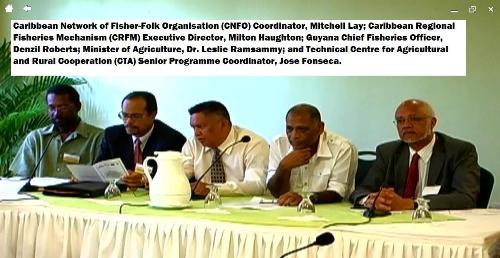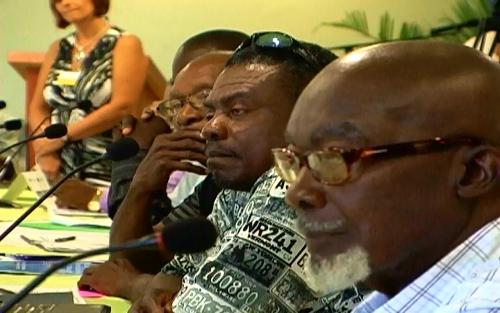|

|
 |
|
Last Updated: Feb 6, 2017 - 2:32:04 PM |
More money, more jobs, greater food security for the Caribbean – but only if threats are overcome
Belize City, Belize - A four-day regional consultation on small-scale fisheries, the most extensive fisheries subsector in the Caribbean, has paved the way forward for fisherfolk to become more active in shaping and implementing policy and better poised to play a more impactful role in steering the way forward, even as critical challenges such as overfishing; illegal, unreported and unregulated (IUU) fishing; and weak policy implementation confront the region.

|
Representatives of the Caribbean Network of Fisherfolk Organisations Coordinating Unit (CNFO-CU), national fisherfolk organizations (NFOs), and NFO Steering Committees from 15 CARIFORUM member states last week attended the CTA/CRFM/CNFO Consultation to formulate Small-scale Fisheries Governance Arrangements for the Caribbean, held at Grand Coastal Hotel in East Coast Demerara, Guyana.
“Today’s gathering is… making sure that our fisherfolk, the people who are actually the ones keeping this industry alive, are very much part of this [common fisheries] policy—not only in the crafting of it, not only in the adoption of it, but also in its implementation,” said Minister of Agriculture, Dr. Leslie Ramsammy in ceremonies held to kick off the event.

|
The minister said that the Common Fisheries Policy must be adopted and implemented right away. He also urged fisherfolk to take ownership of it as their policy.
Towards this end, fisherfolk present at the consultation had the opportunity for extensive dialogue, during the talks coordinated by the Technical Centre for Agricultural and Rural Co-operation (CTA), the Secretariat of the Caribbean Regional Fisheries Mechanism (CRFM), and The Caribbean Natural Resources Institute (CANARI).
The participants in the consultation were able to analyse the implications of regional policy on small-scale fisheries. They also discussed ways in which they could strengthen the governance of the CNFO, so that they could more effectively participate in the management and governance of the sector. Other areas of focus were improving information and knowledge sharing, as well as enhancing advocacy by fisherfolk.
Coordinator of the Caribbean Network of Fisher-Folk Organisation (CNFO), Mitchell Lay, emphasized the need to get maximum benefit from the sector. He commended the fisherfolk present for making the sacrifice to travel to the consultation.
“The direct engagement of fisherfolk is a necessity,” said Senior Programme Coordinator, Technical Centre for Agricultural and Rural Cooperation (CTA), Jose Fonseca. “It’s not only a moral requirement; it’s a technical, a scientific and a political requirement for the formulation of contemporary policies and for future policies.”
Fonseca emphasized the need for the establishment of policies at the national level to give effect to the Common Fisheries Policy for CARICOM.
Executive Director, Caribbean Regional Fisheries Mechanism (CRFM), Milton Haughton, cited the major challenges facing the sector. One such challenge is inadequate and incomplete information on fish stocks; so the precautionary approach is required, he said.
“Fishing takes place over vast areas of seas and ocean spaces. It is, therefore, often very difficult to monitor and enforce management and conservation measures that are required to ensure sustainability of the fisheries and to protect the ecosystem,” Haughton said. “For this reason, illegal, unregulated and unreported (IUU) fishing is a major challenge in the region and globally.”
“IUU fishing is a genuine, legitimate problem for the industry, for the economy of our countries…” agreed Minister Ramsammy.
He pointed to the need for periods of no fishing and the regulation of fish capture, such as size and quantities.
“Fisherfolk must see that the rules and regulations governing stocks and fishing activities are not done to punish anyone but to ensure we sustain the stocks,” said Ramsammy.
The region’s strategy must then ensure that fisherfolk are able to safeguard their livelihoods, while respecting limitations designed to ensure that the fisheries upon which they depend don’t crash due to indiscriminate practices. The incentive lies in better fish production that not only means less poverty but also greater food security.
Both Haughton and Ramsammy expressed concerns that the region’s import bill is way too high, notwithstanding the growth in regional production possible through aquaculture.
The Caribbean is, in fact, a net importer of fisheries products. Haughton noted that the region exported 59,000 metric tonnes of fish and fish products valued at US$252 million in 2009, whereas it imported 75,000 metric tonnes of fish valued at US$218 million that same year. The new fisheries policy seeks to shift this paradigm, to promote food security through less importation and more sustainable fishing practices at home.
Whereas a word of caution was shared on sustainable fishing, a door of opportunity was opened for further engagement, as fisherfolk, for the first time, have been invited to play an active role in Caribbean Week of Agriculture. Ramsammy publicly charged his staff to ensure that fisheries will now be in the spotlight.
Minister Ramsammy said that Guyana, in hosting Caribbean Week of Agriculture in 2013, will ensure that fisheries plays a critical role in the celebrations and that the CNFO sits on the working group organizing the event.

© Copyright 2013 by thebahamasweekly.com
Top of Page
|
|
 |

|
